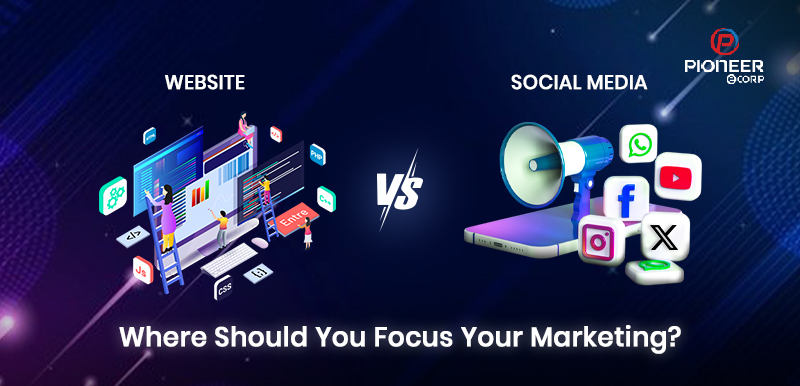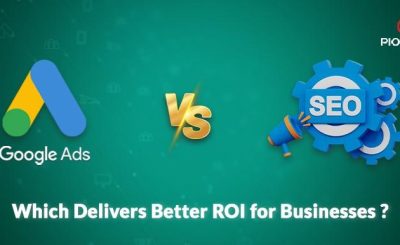In the ever-evolving world of digital marketing, one question that consistently challenges business owners and marketers alike is this: should you focus more on your website or your social media presence? Both platforms serve important purposes, but choosing where to invest your time, energy, and budget depends heavily on your goals, audience, and long-term strategy.
Let’s break down the pros and cons of each, and help you determine where your brand should focus its digital marketing efforts.
The Role of a Website in Marketing
Your website is your digital headquarters. It’s the one platform you fully own and control, unlike social media platforms that can change their algorithms or rules overnight. A professionally built website builds trust, delivers information, and converts visitors into leads or customers.
A good website allows you to showcase your products or services in detail, host blogs that improve SEO, and build authority through valuable content. With the right tools, you can also collect emails, manage bookings, and sell products directly. It becomes the hub that all your other marketing efforts should drive traffic to — whether it’s from ads, organic search, or social media.
Importantly, websites are a key component for search engine visibility. If you want to appear in Google search results and capture intent-based traffic, your website’s structure, content, and speed will play a big role. Long-term, a well-optimized website helps generate consistent, high-quality leads and sales with less reliance on third-party platforms.
The Power of Social Media for Marketing
Social media, on the other hand, excels at building brand awareness and community. Platforms like Instagram, Facebook, LinkedIn, and youtube allow you to connect with your audience in real time, show your personality, and engage through comments, stories, and DMs. For many brands especially in B2C or lifestyle niches social media is the primary way to stay visible and relevant in the minds of customers.
The visual and interactive nature of social media helps humanize your brand. It’s ideal for storytelling, product demos, user-generated content, and even viral moments. Paid social media ads also offer incredible targeting options, making it a smart choice for promoting time-sensitive offers or events.
However, social media comes with its limitations. Algorithm changes can tank your reach overnight. Your follower list isn’t truly yours, and social platforms control how and when your content is shown. That means you’re always playing by their rules, and long-term growth is less stable if you depend solely on them.
Website vs Social Media: Key Differences to Consider
A major difference lies in ownership. Your website is your asset you own it, you control it. Social media platforms are rented space. They can suspend accounts, restrict visibility, or change rules at any time.
Another distinction is audience intent. People visiting your website usually have intent — they want to learn more, buy something, or contact you. Social media audiences are often browsing casually, so they’re less likely to convert right away. That’s why social is often stronger at the top of the marketing funnel, while websites close the deal further down.
When it comes to data and analytics, websites offer deeper insights. With tools like Google Analytics and Search Console, you can understand exactly how users interact with your content. Social media analytics are more limited and focused on engagement rather than conversions or revenue.
Where Should You Focus: Website or Social Media?
The answer depends on your goals.
If your primary goal is brand visibility, staying connected with your audience, and driving engagement, then social media should be a strong focus. It’s where people spend their time, and it allows for fast, informal interaction. But if your goal is long-term lead generation, SEO growth, and consistent conversions, your website must be the foundation of your digital marketing strategy.
Ideally, your marketing strategy should combine both — using social media to attract and engage, and then driving traffic to your website to educate and convert. This creates a full-funnel approach that maximizes your online presence.
A Smart Strategy: Integrate Both Channels
Successful modern marketing doesn’t treat your website and social media as separate silos. Instead, you should make them work together. Use social media to promote your blog posts, landing pages, or service offerings. Share your website’s testimonials and case studies through engaging posts. Capture emails from your social audience and bring them into your website ecosystem.
At the same time, make it easy for your website visitors to follow you on social media. Add social icons, embed feeds, and encourage sharing. The goal is to create a seamless customer journey where both platforms reinforce each other.
Final Thoughts
In the debate between website vs. social media, there is no one-size-fits-all answer but one truth remains clear: your website is your home base, and your social media is the gateway. If you’re building a brand that lasts, you need both. Use social media to start the conversation and your website to continue it and convert that attention into action.
Looking to improve both your website and social media strategy? Start by reviewing your goals, understanding your audience, and building a marketing plan that brings both platforms into alignment.






Leave A Reply